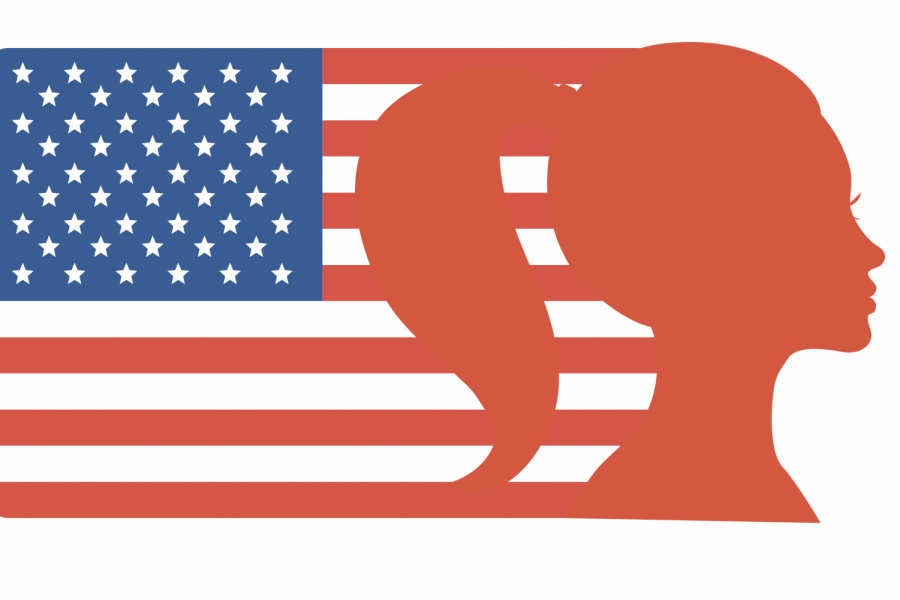Living through history: How the United States can move forward as a nation
We are living through history, an unprecedented time which we must all be cognizant of.
March 23, 2021
This is not America.
America shouldn’t have rioters brandishing hateful messages, beating police officers into the ground and weaponizing the pole end of the same flag we recite the Pledge of Allegiance to every morning in our classrooms. When we promise “liberty and justice for all,” that “all” should fully include every person of color in the nation. That “all” should include George Floyd, whose murder has yet to receive justice after more than six months.
It’s understandably difficult to accept our nation’s deep-rooted baggage and present-day difficulties; they contradict the pristine image of a land of opportunity and a perfectly blended cultural melting pot which we were sold at a young age.
But despite how disheartening the truth may be, we, the American public, must face our country’s problems in order to respond to them in realistic, modern ways. Acknowledgement is the first step towards improvement. Choosing not to act is dangerous; complacency and a romanticization of an imagined past only lead to injustice.
There’s a vast disconnect between the reality of our country and the idealistic image the United States likes to portray. Recognizing this difference allows us to better understand the struggles of other nations. Moments such as the storming of the Capitol reveal that no state is immune to instability and threats to national security.
Reflecting on the fragility of democracy can also force us to remain vigilant in protecting our institutions and the values we hold dear. In the past, I felt as though political turmoil and the fanatic rise of nationalism were merely paragraphs in history books. It seemed ridiculous for me to consider any such event taking place in the United States, especially today.
I know better now.
But to accept our present situation, we also need to recognize the realities of our past. Refusing to do so can potentially lead to the reinstatement of antiquated ideas. It was the contrast of an inaccurate, rosy view of history against the harsh realities of the present that fueled the success of Trump’s 2016 election campaign. The hopes and dreams of some members of the American public, who embraced an idyllic image of our nation, differed greatly from the reality of our country and the quality of life that Americans faced. But the “great again” that Trump wanted to make wasn’t all that great in the first place; it was riddled with inequality, racism and ignorance.
In reality, the United States has never truly been “great” on the global stage. When it comes to education, our scores are less than satisfactory, with students’ math skills remaining far behind world leaders and below the global average since the 2000s, ranking 30th in 2018. The U.S. has also trended downwards in terms of the World Happiness Ranking ever since the first World Happiness Report in 2010, where we ranked at 11th place; in 2020, the U.S. was ranked 18th. The U.S. never has been close to a perfect country. If we can’t accept these truths, it will be impossible for us to move forward.
Some may argue that bringing up our nation’s problems may destroy pride and patriotism. The Trump Administration limited the teaching of Black history in public schools for that very reason. Others may argue highlighting past and present issues damages our optimism and our hope for the future, relying on fear to enact change.
At face value, these points may seem valid, but thinking critically about our country isn’t unpatriotic. In fact, placing the country on a pedestal and deeming it impossible to criticize is an idealism that’s truly detrimental to the safety of our republic.
There’s a difference between patriotism and nationalism. Nationalism is founded on the very principle that our nation and its leaders should never be questioned, and in turn, this ideology breeds dictatorships and autocracies. But patriotism and the strength of a democracy come from the balanced relationship of power between the government and the people, and the understanding that regardless of office, public servants are always accountable to the people they serve. Criticizing our country is patriotic, because being willing to address our weaknesses allows us to ultimately improve as a nation.
In my world history class, we watched a documentary about the 1918 influenza pandemic, known colloquially as the Spanish Flu. It felt incredibly reminiscent to what we’re experiencing today, with fear and confusion running rampant across the world. In order to prevent further spread of the virus, one woman shared how people in public places donned homemade masks — strikingly similar to the medical grade ones common today. Without modern scientific understanding, there was little else that could be done, but communities came together and cared for one another. At the end of that pandemic, the United States was left with 650,000 people dead. As of writing this opinion, the United States carries the dark mark of around 506,000 deaths as a result of the coronavirus pandemic. It may sound cliche, but if we don’t accept history through a critical lens, we are doomed to repeat it. What are the stories we will tell in the future, to the next generation? How will we remember our actions?
We’re living in history, so it’s time for us to accept the truth as a nation.
This is America.
So how are we going to fix it?









